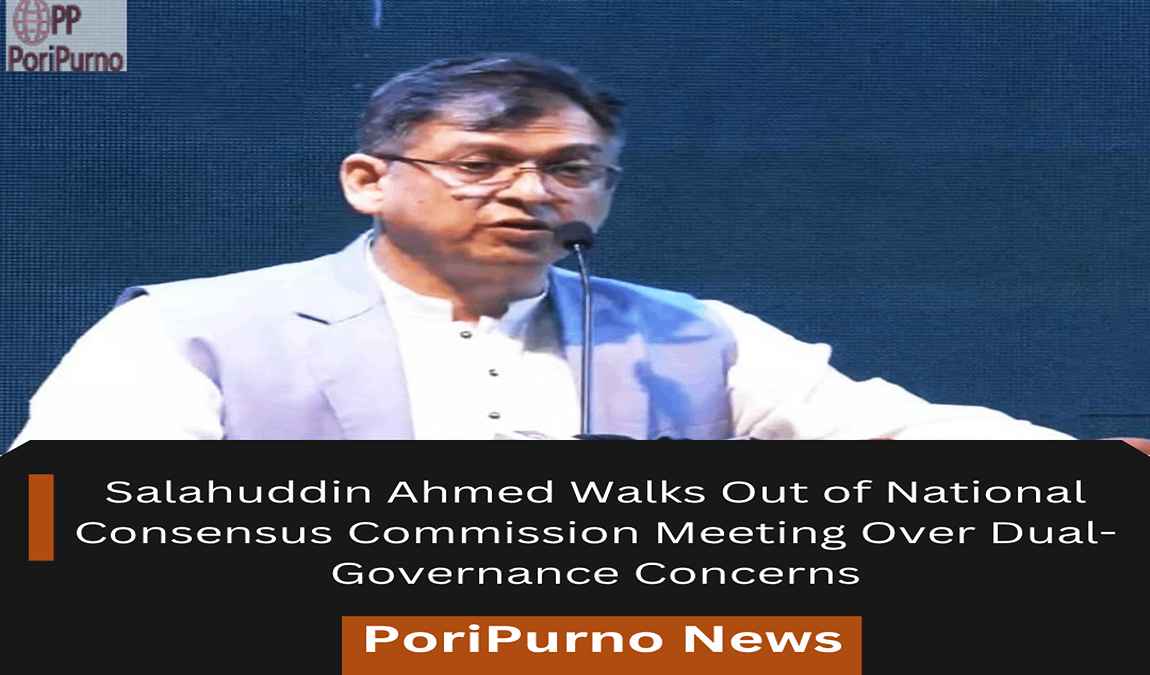PoriPurno News Desk | August 02, 2025
In a dramatic move that has sparked political discourse across the country, Salahuddin Ahmed, a key member of the National Consensus Commission, walked out of a crucial meeting today, citing serious concerns about the potential emergence of a dual-governance structure that could undermine the authority of any elected government.
The walkout occurred during a heated discussion over proposed reforms regarding the appointment of heads to constitutional bodies such as the Public Service Commission, Anti-Corruption Commission, Comptroller and Auditor General (CAG), and the Ombudsman. The commission had suggested forming an independent committee to handle these appointments, a proposal Salahuddin firmly opposed.
“A Government on Paper Cannot Govern in Practice”
Salahuddin’s core objection revolves around a possible erosion of executive power, warning that a scenario in which elected officials are stripped of their right to appoint key members of their governing team would reduce the government to a mere “paper tiger.” According to him, if the executive branch lacks authority, its influence over the civil administration and law enforcement would naturally diminish, opening the door for a parallel, unelected power structure—what he terms a “dual-governance system.”
Such a system, he argued, is already partially visible under the current interim government, which has struggled to gain full cooperation from civil and police officials despite nearly a year in power. “You can’t expect a functioning government if its hands are tied. Power without authority is meaningless,” he asserted.
The Debate: Reforms or Overreach?
Proponents of the reform argue that limiting the executive’s power is essential to prevent authoritarianism or the return of fascist tendencies. However, Salahuddin countered by pointing out that major reform proposals—such as the limitation of a Prime Minister’s tenure to 10 years and the establishment of an independent Election Commission through a bipartisan search committee—have already been accepted. These measures, he says, adequately safeguard against unchecked power.
“Why, then, is there still an attempt to curtail executive authority? If you have a functioning judiciary, free press, a powerful election commission, and fixed tenure for leaders, what’s the justification for neutering the executive further?” he questioned.
A Call for Legislative Solutions
Rather than forming separate appointment committees, Salahuddin advocated for enacting strong legislation to govern appointments in these key institutions. He warned that creating extra-constitutional bodies or committees to manage appointments risks creating another layer of unaccountable power.
He further emphasized that ministers and deputy ministers are elected by the people and are answerable directly to the electorate. Diluting their authority while expecting them to remain accountable is both illogical and undemocratic. “Would it make sense if I were held responsible for decisions made by people I didn’t appoint?” he asked rhetorically.
Increase Your Business with Expert Digital Solutions!
Get Unlimited Facebook Ad Credit, Guaranteed SEO Rankings, & Professional Web Development – all under one roof at MahbubOsmane.com!
14+ Years of Experience – Guaranteed SEO Rankings
800+ Satisfied Clients – Unlimited Facebook Ad Credit
Proven Results, Maximum ROI – Professional Web Development
Contact us ( +8801716988953 WhatsApp ) today and take your business to the next level! Visit: MahbubOsmane.com
Notable Quotes from Salahuddin Ahmed:
“If constitutional appointments are made by unelected bodies, and the elected government is sidelined, then we are formalizing a dual-power system.”
“Reform cannot come at the cost of stability. We are not here to build a state with three governments—elected, appointed, and foreign-advised.”
“A weak executive equals a weak democracy. Do not confuse checks and balances with administrative paralysis.”
Conclusion: Reform with Balance, Not Imbalance
Salahuddin Ahmed’s exit from today’s meeting sends a strong message: in the pursuit of reform, the foundational principles of representative governance must not be compromised. He concluded by urging fellow commission members not to impose foreign-endorsed governance models that could potentially weaken the state from within.
“Judicial oversight is vital, yes,” he said, referencing Justice Mustafa Kamal’s observation in the famous Kudrat-E-Elahi case that “The court is not the only light at the end of the tunnel.” But, Salahuddin insisted, governance requires authority—and executive power is not a luxury; it is a necessity for any functioning democracy.
Do you still have questions? Or would you like us to give you a call?
Call us at wa.me/+966549485900 or wa.me/+8801716988953 to get a free consultancy from our expert or you can directly email us at hi@mahbubosmane.com We would be happy to answer you.
